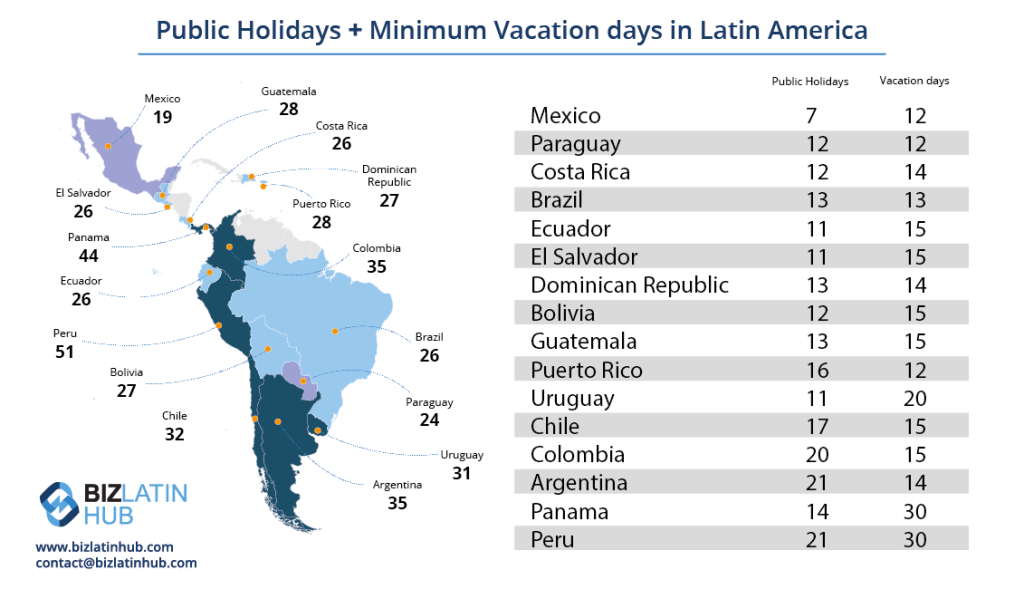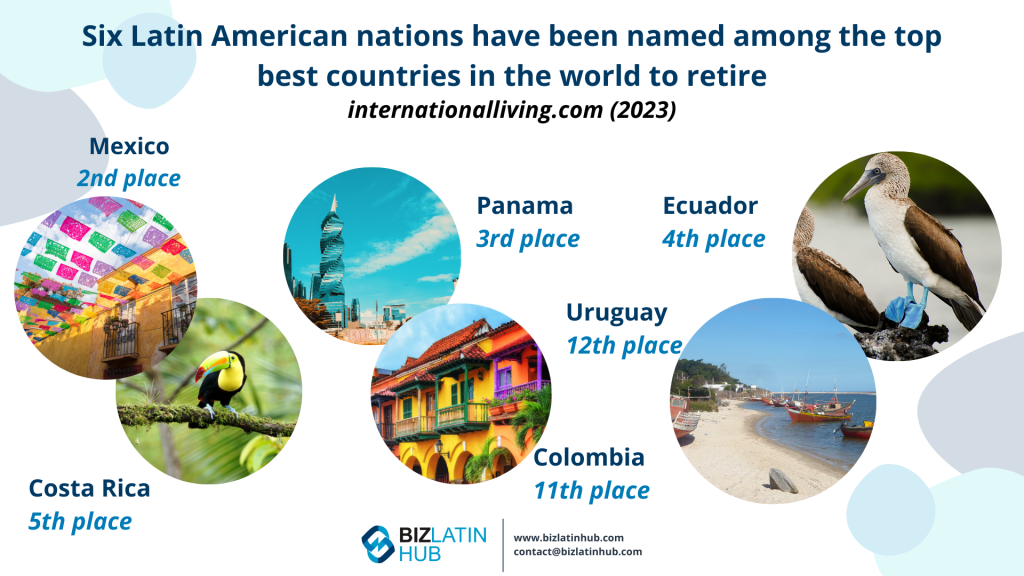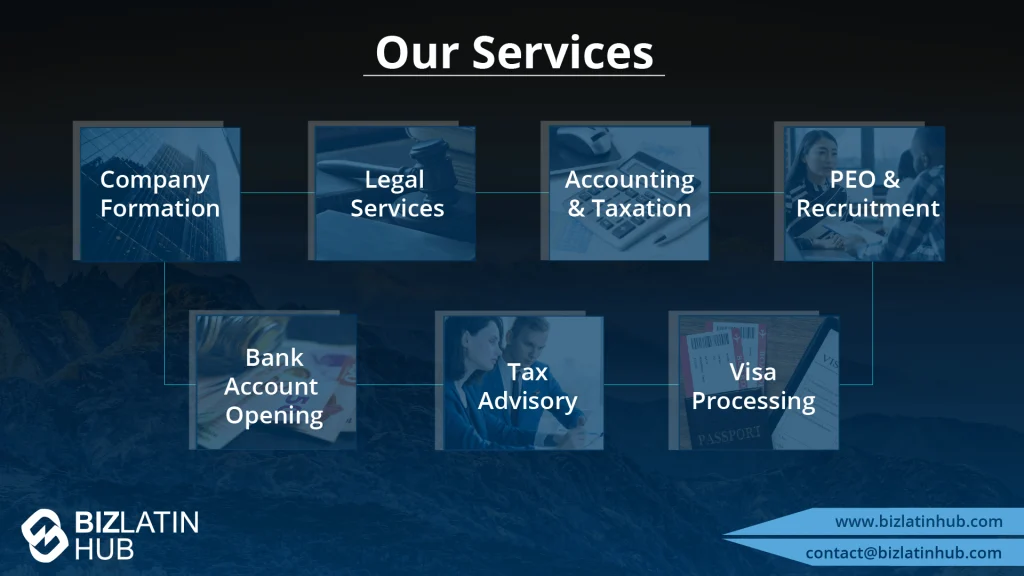Latin America has long been known for its strong work ethic and rich cultural heritage. Maintaining a workforce that is highly productive and engaged takes finding the right balance of work and leisure, and Latin America is closer to achieving this harmony. These public holidays in Latin America, alongside minimum vacation allowances give the region’s hard-working citizens a well-earned break.
Public holidays in Latin America are among the highest vacation days awarded globally. This promotes a healthier work-life balance for employees throughout the region. This may contribute to a more well-rested and balanced workforce. If this interests you or your company, it may be worth looking into LLC formation in Brazil– one of the leading countries in the world for paid annual leave.
Depending on the country, the number of public holidays in Latin America may significantly outweigh other regions. These holidays reflect a plethora of cultural, historical, and religious celebrations. The balance between work and life is extremely important in Latin American countries, and respecting these observances contributes significantly to the happiness of workers throughout the region.
The minimum vacation days in Latin America vary depending on the country, but most countries allot around 15 days per year to vacation days. Mexico is on the low end, permitting only six paid days off work. This number gradually increases with increased tenure in the company. Several countries offer 30 days of vacation time– such as Peru, Brazil, Panama, and Argentina.

How many Public Holidays in Latin America?
The public holidays in Latin America vary based on the country. Here we will provide the approximate number of public holidays celebrated in each Latin American country, as of 2023:
- Argentina: Approximately 19 public holidays.
- Belize: Approximately 12 public holidays.
- Bolivia: Approximately 14 public holidays.
- Brazil: Varies by state; an average of 10 to 15 public holidays at the national level.
- Chile: Approximately 17 public holidays.
- Colombia: Approximately 18 public holidays.
- Costa Rica: Approximately 13 public holidays.
- Cuba: Approximately 10 public holidays.
- Dominican Republic: Approximately 13 public holidays.
- Ecuador: Approximately 12 public holidays.
- El Salvador: Approximately 11 public holidays.
- Guatemala: Approximately 10 public holidays.
- Haiti: Approximately 14 public holidays.
- Honduras: Approximately 11 public holidays.
- Mexico: Approximately 11 national public holidays, with additional regional holidays varying by state.
- Nicaragua: Approximately 9 public holidays.
- Panama: Approximately 14 public holidays.
- Paraguay: Approximately 11 public holidays.
- Peru: Approximately 13 public holidays.
- Uruguay: Approximately 15 public holidays.
- Venezuela: Approximately 14 public holidays.
While these are averages, many of these countries provide their citizens with a significant amount of free days dedicated to celebrating important public holidays in Latin America. Countries like Argentina and Colombia offer residents a very high number of public holidays, which may contribute to the work-life balance equilibrium.
What are the minimum vacation days in Latin America?
While short-term work relief is provided by public holidays, prolonged periods of rest and renewal require a certain number of vacation days. The number of legally required minimum vacation days varies throughout Latin American nations.
Here are the minimum vacation days in Latin America, based on each country:
- Argentina: 14 vacation days per year.
- Bolivia: 15 vacation days per year.
- Belize: No specific minimum vacation entitlement.
- Brazil: 30 consecutive calendar days of paid vacation after one year of continuous employment.
- Chile: 15 working days of vacation per year, equivalent to three weeks.
- Colombia: 15 working days of paid vacation per year, equivalent to three weeks.
- Costa Rica: 12 vacation days per year.
- Cuba: 15 vacation days per year.
- Dominican Republic: 14 vacation days per year.
- Ecuador: 15 vacation days per year.
- El Salvador: 15 vacation days per year.
- Guatemala: 15 vacation days per year.
- Haiti: No specific minimum vacation entitlement.
- Honduras: 10 vacation days per year.
- Mexico: 6 working days of paid vacation after one year of service, increasing gradually to a maximum of 12 working days after four years of service.
- Nicaragua: 10 vacation days per year.
- Panama: 30 calendar days of paid vacation after one year of continuous service.
- Paraguay: 15 vacation days per year.
- Peru: 30 calendar days of paid vacation per year, which can be split into two periods if agreed upon by both parties.
- Uruguay: 20 working days of paid vacation per year, equivalent to four weeks.
- Venezuela: 15 vacation days per year.
These figures represent the minimum legal requirements; and some employers may offer additional benefits and days. For Belize and Haiti, although there is no mandated vacation allotment, that does not mean that companies do not provide vacation days. Cultural norms and policies/agreements, specific to each country, may offer additional insight into what to expect with minimum vacation days in Latin America and these countries specifically.
Which countries have the most vacation days in Latin America?
If you are looking to find that adequate work-life balance, these countries offer the most vacation days:
- Brazil, Panama, and Peru
All three countries offer 30+ days of paid vacation, which are applicable after a years’ worth of tenure to the company.
These countries offer workers substantial time to rest and partake in personal fulfillment opportunities.
Why is it important to have time off from work?
The public holidays in Latin America, as well as the minimum vacation days in Latin America, play an essential role in promoting a healthy work-life balance for those in the region. There are many reasons why it is important to have time off from work, but some of the most frequently mentioned ones are:
- Rest and relaxation: The devoted time off from work that public holidays and vacation days offer employees allows them to rest, refuel, and partake in activities that encourage both physical and mental relaxation.
- Benefits to one’s health: Getting enough sleep and leisure time is essential for maintaining good health. It aids in preventing illnesses brought on by stress and fatigue that are related to the workplace.
- Enhanced productivity: It has been demonstrated that regular breaks, including vacations, boost productivity and work effectiveness. People can refuel, develop fresh views, and return to work more motivated and focused after taking time off.
- Quality time with loved ones: Public holidays and vacation days provide an opportunity for individuals to spend quality time with family and friends.
- Personal development: Taking time off from work helps people to pursue their hobbies, interests, and self-improvement interests.

Biz Latin Hub can help you stay compliant with public holidays and minimum vacation days throughout Latin America
At Biz Latin Hub, we provide integrated market entry and back-office services throughout Latin America and the Caribbean, with offices in Mexico City and Buenos Aires, as well as over a dozen other major cities in the region. We also have trusted partners in many other markets.
Our unrivaled reach means we are ideally placed to support multi-jurisdiction market entries and cross-border operations.
Our portfolio of services includes hiring & PEO, accounting & taxation, company formation, bank account opening, and corporate legal services.
Contact us today to find out more about how we can assist you in finding top talent or otherwise do business in Latin America and the Caribbean. If this article on public holidays and minimum vacation days in Latin America was of interest to you, check out the rest of our coverage of the region. Or read about our team and expert authors.






